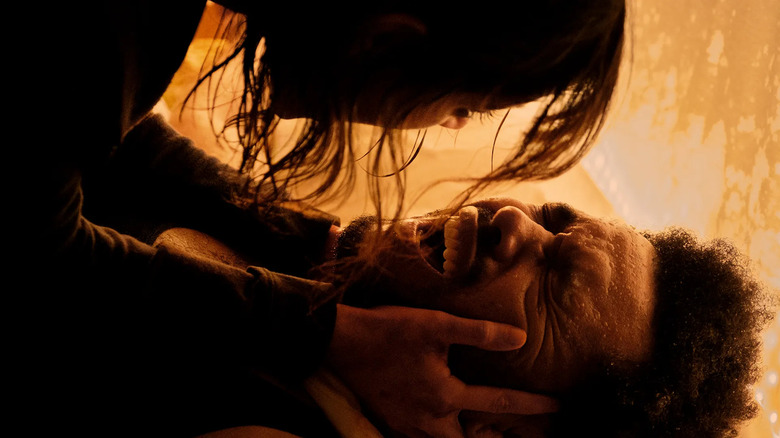Trey Edward Shults’ new film “Hurry Up Tomorrow” is part of a vast multimedia project that trip-hop chanteuse Abel “The Weeknd” Tesfaye has been constructing since January 2025, when he released a concept album of the same name. The film seems to sport a narrative that has had been extrapolated from the album by co-screenwriters Shults, Tesfaye, and Reza Fahim, although it clearly aims to be a dreamy, hallucinatory opera of sorts, telling its story through outsize emotional beats. And on the surface, there are certainly a lot of emotional outpourings. There are tears, screams, and nightmares. Stylistically, there even appears to be an attempt to peek into the Weeknd’s beak inner darkness.
Advertisement
But all the dreamy electronica on the soundtrack can’t cover the fact that “Hurry Up Tomorrow” is dull, mediocre, plodding nonsense. It’s bad, guys. Really, really bad. The film doesn’t so much capture the Weeknd’s complex soul, as it does give a megaphone to a pitiful whiner. Tesfaye tries to set up his on-screen character as a troubled, suffering artist, lost in a (possibly self-inflicted) post-breakup malaise, but he never actually describes the circumstances of the breakup, or why his ex was so angry with him. Riley Keough, only seen in pictures and heard over the phone, plays he ex-girlfriend, and she is only credited as “Girl on Voicemail.” Shults and Tesfaye haven’t made a complex drama about relationships gone awry, but an abstract examination of adolescent self-pity. The girlfriend is an abstract figure who only exists to allow the main character to wallow in pathos. The same could be said of Anima (Jenna Ortega), a young woman whose eye he catches at a concert, and who may provide his emotional salvation.
Advertisement
And, yes, the character is named “Anima,” which will make all students of Jung roll their eyes. And that’s one of the more subtle pieces of symbolism in this self-indulgent mess.
Hurry Up Tomorrow is all style and no substance, and even the style isn’t that interesting
Shults has previously made some intriguing films like the slow-dread horror film “It Comes at Night,” and the dreamy morality play “Waves.” Here, he seems under the gun, trying to lay some kind of profundity onto an artist who is desperate to appear more tortured and complex than perhaps he is. Shults incorporates a lot of abstract extreme close-ups, shift aspect ratios, and even artificially inserts film scratches to capture that old 35mm feel. In a standout nightmare sequence, Shults taps into his inner David Lynch, depicting a mother figure on fire in a field, warming a nearby child. Did I mention that the symbolism isn’t subtle?
Advertisement
None of that, however, can erase how frustratingly emotionally vague “Hurry Up Tomorrow” is. The film begins with the above-mentioned Girl on Voicemail telling Tesfaye (he plays himself) that “A good person wouldn’t have done that to someone they love.” What did he do? It’s never explained. If Tesfaye were playing his vicious manipulator character Tedros from the short-lived embarrassment “The Idol,” then such a message would have made sense, but here, we’re left wondering what he did that would warrant such a reaction. We don’t know if he’s in the wrong. All audiences are made savvy to is that he’s suffering.
And, boy howdy, is it ever a pity party. The breakup came in the middle of the Weeknd’s world tour, and he may be going hysterically mute, like Liv Ullmann’s character in “Persona.” A musician is losing his voice. See my above comments on the film’s symbolism, vis-à-vis its subtlety. A doctor gravely warns him that it’s all psychological, and that he runs the risk of damaging his throat permanently if he can’t work through his pain. The only character with any kid of toe in reality is Tesfaye’s manager Lee (the wonderfully naughty Barry Keoghan), an enthused coke gremlin who uses earnest compliments and a few snootfuls of snow to get his charge on stage.
Advertisement
The Long Weeknd
Just as the Weeknd’s voice breaks on stage, he locks eyes with the desperate young Anima. They seem to fall instantly in love, and they take a quick contraband jaunt to Coney Island (played by the Santa Monica Pier). This is likely going to be dangerous for our hero, however, as Anima was introduced tearfully soaking a remote country home in gasoline and lighting it on fire. Later in the film, Anima will get a hysterical call from her mother (also, curiously, voiced by Riley Keough) wondering why she did that. Anima has no answer.
Advertisement
The pacing is awful, by the way. By the time Tesfaye and Anima are having their little roller coaster date, we’re almost an hour into the film. Nothing happens, but at least we have to wait for it. The evening seems nice, but it’s only a matter of time before this Manic Pixie Nightmare Girl snaps.
Anima then hastily pushes “Hurry Up Tomorrow” into “Misery” territory, showing what happens when a slightly-cracked superfan meets her hero in a vulnerable position. In both “Hurry Up Tomorrow” and “Misery,” the celebrity will end up being tied to a bed while their fan tortures and interrogates them. “Hurry Up Tomorrow” isn’t as striking, however, as the superfan’s torture involves an essaying analysis of the Weeknd’s real-life art. Many will also be thinking of the Huey Lewis sequence in “American Psycho,” wherein a killer essentially reads their own review aloud. Tesfaye is essentially staging the world’s worst press interview. The torture scenes aren’t meant to be funny, but many people in my theater — including me — were laughing nonetheless.
Advertisement
Pink Floyd: The Wall this ain’t
Ortega tries to lend some darkness to the role, but her wild eyes and illogical behavior have her emerging as a semi-comedic Tim Burton character. The film’s greatest relief (and biggest laugh) comes when Tesfaye finally shakes his way out of the film’s chewy, foggy reverie to tell her to shut the f*** up.
Advertisement
But a question lingers: how does Tesfaye feel about his own work? Is he declaring that it only appeals to teary, deluded arsonists who tie victims to beds? Does he feel he is being emotionally irresponsible by floating songs about suffering into the pop consciousness? Is he inspiring bad behavior by pushing himself too hard in front of millions? And if he feels he’s a monster, what did he do? What are his actual bad habits (beyond the boots of coke)? None of these questions are answered, or even effectively asked. “Hurry Up Tomorrow” is a mush of pseudo-emotional porridge that indulges an imaginary version of its hero. “Pink Floyd: The Wall,” this ain’t.
The Weeknd, as he is depicted in “Hurry Up Tomorrow,” is empty. The film has the stylistic vocabulary of a self-interrogation, but none of the immediate rawness. One will not get the impression that the film is an actual confessional or genuine outpouring of guilt. It doesn’t go further than a (actually pretty good) scene wherein Tesfaye loses his cool while leaving a phone message for his ex. The film whines that being famous is hard and that breaking up is hard to do.
Advertisement
We’re expected to find the Weeknd’s melancholy entertaining. It isn’t. Nor is “Hurry Up Tomorrow.” It’s just awful.
/Film Rating: 2 out of 10
“Hurry Up Tomorrow” opens in theaters on May 16, 2025.












